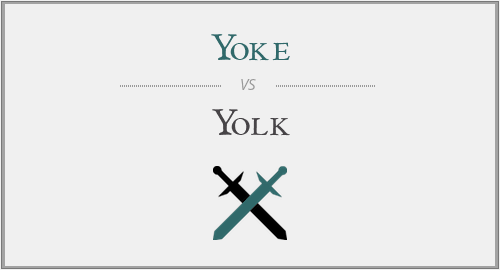Do you often find it difficult to distinguish "yoke" from "yolk" because they are spelled so similarly? Well, then it's essential that you remember the definition of each and make sure you don't confuse them, because their meanings are not identical at all and misspelling or replacing them with the other will actually make your message not only confusing, but actually funny.
Make sure you don't say you like eating the "yoke" of your eggs or that people used a "yolk" to attach heavy weights to their animals, cause the words refer to so different things that your error will be clearly illustrated. Below you'll find the simplest explanations for the pair of words "yoke" and "yolk".
Yoke vs. Yolk
So both "yoke" and "yolk" are quite common words in the English vocabulary, there is no restriction to using them only in certain contexts, domains, formal or informal language or anything like that. The only important thing is not to confuse them - just make sure you use "yoke" and "yolk" with their real meanings.
When do we use "yoke"?
"Yoke" is a tool. It's a device made out of wood used (generally in the antiquity or old times), to draft animals such as oxen, in order to make them work together to carry heavy machines or luggage by joining their heads or necks. That's as a noun. As a verb, "yoke" defines the action of putting a yoke on an animal.
Example 1: Put the yoke on those oxen, otherwise they won't carry your cart. - "yoke" as a noun refers to the wooden frame used to join more animals to work together.
Example 2: I should yoke these animals, shouldn't I, if I want to guide them easier? - "yoke", as a verb, illustrates the action of putting on a yoke.
When do we use "yolk"?
The thing with "yolk" is as simple as it can be. "Yolk" is the round-shaped yellow part of an egg. Nothing more, nothing less to remember about this noun.
Example: How do you like the yolk in boiled eggs, soft or hard? - "yolk" is the yellow part from the middle of an egg.
Conclusion
Nothing too complex out there with "yoke" and "yolk", it's just a common misunderstanding or error of usage caused by the spelling similarities between them. Next time, simply remember that "yolk" is one of the most basic and easy words in English, referring to the yellow part of an egg, while "yoke" is simply a wooden tool, used before, to join animals to work together.





Have a discussion about this article with the community:
Report Comment
We're doing our best to make sure our content is useful, accurate and safe.
If by any chance you spot an inappropriate comment while navigating through our website please use this form to let us know, and we'll take care of it shortly.
Attachment
You need to be logged in to favorite.
Log In